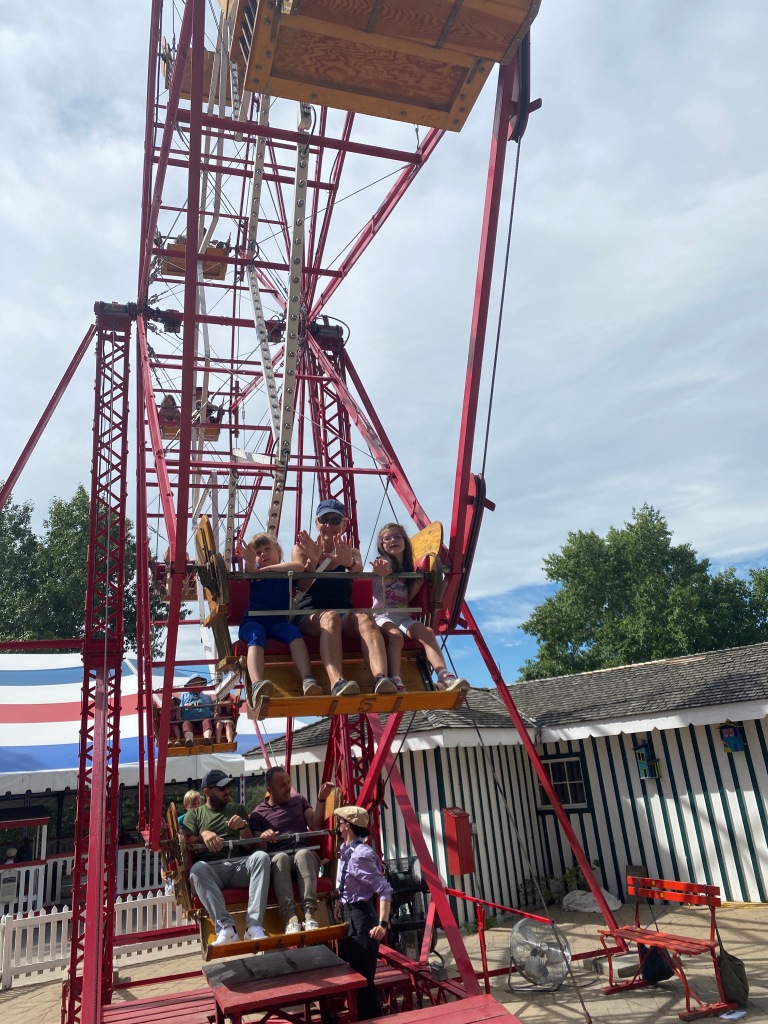I remember the name, and the tasteless jokes we immature teenagers batted around, having no idea what was going on, nor even where it was happening. Half of a Yellow Sun is a novel about what happened to Biafra, 1967 to 1970. A little country that never had a chance. To shut it down, they starved and otherwise slaughtered 3 million people. It’s a book by Chimamanda Ngozi Adichie, a Nigerian author and public speaker, herself Igbo, one of the major people groups in Nigeria.
In about 2006 or 7, I was part of a group visiting Nigeria and Congo to learn about AIDS. At the time, the WHO said 5000 to 10,000 people were dying of AIDS every day, most of them in Sub-Saharan Africa; we met many affected by this illness and still many others who were health and church and government workers responding to this global pandemic.
Our first evening in Nigeria, one of the MCC workers, Gopar Tapkida gave us a couple of hours about Nigeria. An introduction to a large country of over 400 languages, set up by the British to be ‘a north’ and ‘a south’. Loosely, Gopar said the north was mostly Muslim, with less access to schools, less education and therefore also less access to political power. The south, he said, had been more opened to western missionaries and with them came access to education, influence and power. It was an arbitrarily constructed dynamic, almost designed for conflict. And so, frequently, violence would break out, as it does there today. Massacres … on either side. Christian south, Muslim north. In fact, early in our visit we had accidentally met a local evangelical leader at a guest house who, talking about a spate of recent killings, casually said to us … we needed to do something. Otherwise, they don’t stop. Something like … ‘it was our turn’.
Half of a Yellow Sun is actually the flag (or was) of Biafra. This little country of Igbo (and others) people in the South East, corner, a people seen in the north as wealthy, progressive and self assured, they became more and more isolated in the whole of Nigeria until they simply declared themselves a new, separate country, after yet another wave of gruesome killings, particularly of Igbo living in the north. The Igbo (also Ibo) are descendants of the Nri kingdom, the oldest in Nigeria, consisting of about 18% of the total population. Some claim the Igbo are descendants of one of Israel’s lost tribes, after the Assyrians invaded the Northern Kingdom in the 8th century BC, forcing 10 of the 12 tribes of Israel into exile. In 1967 they dared to declare themselves a country, but the international community doesn’t like that kind of initiative, and almost no one recognized this new country, which had rich oil reserves that others had their eyes on. So, instead, they all stood by as Nigeria, with lots of help, crushed it.
I suppose it could be said that what happened in 1967-70 is not very significant for 2022/23. It’s a long time ago. Since then we’ve had the killing fields of Cambodia, Laos and Vietnam, Rwanda, Somalia, South Sudan and Darfur, Canadian Residential Schools, Apartheid in S Africa and Israel, North Korea, the chillingly dirty wars in Argentina, Chile, Bolivia, Guatemala and El Salvador, the Rohingya of Myanmar, the war in Yemen, Syria, Colombia, Venezuela, the endless Palestinian tragedy, Ukraine … . But as with any story of conquest, war and killing and starvation, it never really ends. I suppose it shouldn’t.
Canada prides itself on bringing in a lot of newcomers and refugees over the last 150 years but their stories don’t just begin anew as if the earlier hadn’t happened. Our recent number is quite modest compared to the million Syrians Germany took in back in 2015, but regardless, I’m often struck by the silence of people who come from difficult and horrific stories of brutal trauma and loss, as they struggle and settle here into … what? … our stability? Our peace? Do we expect them to keep their stories to themselves? Do we know that they have stories? Do they simply prefer to keep a silence as they struggle to start over, often having to survive without the language, social and family supports they will at one time have had, back somewhere?
One of the last lines in the book is … ‘the world was silent when we died’. It’s easier, I suppose, for us here in our peace and stability, if the survivors now among us also remain silent. A complicity almost … to keep us from losing sleep. One of the stories in the novel mentions, almost in passing, a woman who has travelled through 5 refugee camps to arrive at yet another one with her baby, and then she dies leaving the baby. The camp manager calls to the priest to come for the body. Another burial. There are many. One source says maybe 14,000 died every day in that small population. There simply was no food. Biafra was the orchestrated starvation of a people.
I read this book, remembering the name, Biafra, from my early teens, but nothing much more. Has there been any justice or acknowledgement of what happened? Of our complicit silence? Of the role the British and French and the Americans played? The Russians with weapons they made available to Nigeria – to test their weapons – so they could subdue a people who wanted only to be left alone? Were the Igbo ever a threat to anyone? They wanted security inside their own borders, borders they had determined, I guess without the British to draw the lines for them. And apparently, that could not be allowed.



